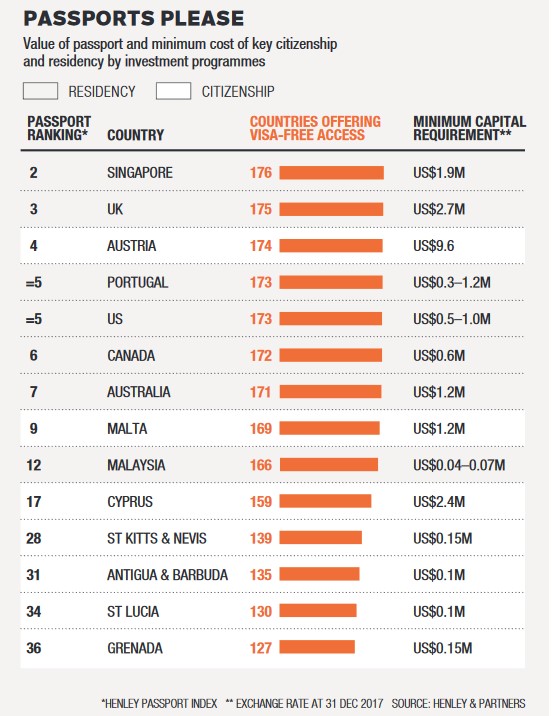The wealthy are no longer just spending their money on private jets, luxury cars, mansions, they're also spending on second citizenship, and often in countries they’ve never even visited.
Buying citizenship and passports can cost anywhere from $100,000 in the island of Dominica to a minimum of $2.4 million in Cyprus, and while it’s not a new trend, it is a growing one as it makes it easier for the wealthy to conduct business, travel freely and sometimes evade authorities.
Last year’s SC Global Partners study found that 89 percent of people would like to own a second passport, and over 34 percent said they had looked into investing in a second citizenship. Also, 80 percent said they would be willing to invest or donate 5 percent of their annual salary towards a second citizenship.
In its recent report, property group Knight Frank detailed the cost of buying second citizenship, with the most expensive citizenship gambits being the UK, Singapore and Austria, while the cheapest locations to buy citizenship are Caribbean nations, recently destroyed by hurricanes.

(Click to enlarge)
In some cases, those prepared to pay $100,000 or more for citizenship don't even need to travel to the country in order to clear the citizenship hurdle. Some countries are currently offering up citizenship in exchange for either a one-off contribution to the nation or an investment in a designated sector. Related: Tesla Could Be The Biggest Loser In The Trade War
Citizenship by investment programs (CIPs) are a big business. Currently, the industry is worth an estimated $2 billion each year and it is estimated that roughly 5,000 people each year acquire citizenship abroad through the programs.
As expected, Chinese citizens are the biggest market for citizenship by investment programs. In the last decade, more than 100,000 Chinese have spent at least $24 billion on second citizenships.
However, there are groups that are concerned that the programs may be vulnerable to abuse and that cash for passports could be exploited by criminals, terrorists, tax evaders and sanctions busters.
For instance, it was recently discovered that Iranian-born individuals bought St. Kitts and Nevis citizenships to evade sanctions and invest in the United States, and that Russian billionaires are avoiding U.S. sanctions by purchasing EU citizenships.
Passport Index recently released a new report ranking the world's passports each year to identify which are the most powerful by the number of countries one can visit without obtaining a visa.
With access to 162 countries, either visa-free or by obtaining a visa upon arrival, Singapore residents can claim their titles as owners of the most powerful passport in the world.
Singapore is followed by South Korea, Japan and Germany.
What may seem surprising to many Americans is that their passport is only the fifth most powerful in the world.
Related: The Fastest Growing Countries In Emerging Europe
And that status is now in danger more than it’s ever been. The U.S. passport has continued to fall out of favor since President Donald Trump took office, with Turkey and the Central African Republic the most recent countries to revoke visa-free status for U.S. passport holders.
At the other end of the desired passport spectrum is Afghanistan, which sits at the bottom of the ranking list.
Citizens of the war-ravaged nation are offered visa-free access to just three countries: Haiti, Micronesia and St. Vincent and the Grenadines. Holders of Yemeni, Iraqi and Syrian passports also face a limited number of countries willing to let their citizens in without prior approval.
By Josh Owens for Safehaven.com
More Top Reads From Safehaven.com:
















